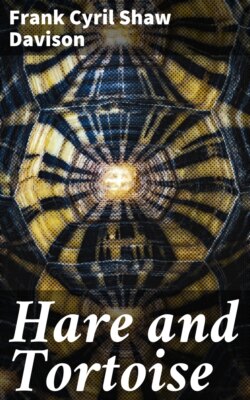Читать книгу Hare and Tortoise - Frank Cyril Shaw Davison - Страница 8
На сайте Литреса книга снята с продажи.
2
ОглавлениеTable of Contents
When Louise and her father were alone they dropped into French which gave them a sense of intimacy and of isolation which they liked. The little doctor was greatly pleased on his arrival from a trying case that night to find her in possession of the library. Her first question, issuing from some depth of revery, was even more unaccountable than her presence.
“Bon soir, Papa,” she greeted him. “Can you tell me exactly how much money I have in the bank, including what Uncle Mornay-Mareuil left me?”
Dr. Bruneau opened his eyes, made a bewildered grimace, went to a desk in the corner, and rummaged for a bank-book. “Including interest to date,” he gravely replied, “eleven thousand, two hundred and thirty-three dollars and thirty-three cents.”
He came to his own chair opposite her, picking up the pipe which she had filled for him. “What’s in that black little head?”
“Many things. More, really, than I know,—or, at least, than I knew.”
“Nothing wrong?”
“... I even wonder if there is anything right.”
He was at once reassured. “You’ve been with Katie Salter. How is she?”
“She’s bearing it. Papa, penses-tu, I delivered the funeral oration.”
“B’en vrai, tu en as! ... What did you say?”
“I talked over their heads, and a little over my own, as though I were under a spell. I thought I was going to say something religious; but it was scarcely that. It was rather like what the cook scrapes together when people turn up for dinner unexpectedly,—philosophical pot-luck. Everybody seemed puzzled, but I wasn’t just inventing words, as I used to do when addressing my paper dolls. The words seemed to make sense in spite of me. ... And I had a strange feeling, afterwards, of having grown up all at once. I don’t think I’ll ever feel sheer girlish again. And the worst of that is, I don’t quite know how a woman is supposed to feel and conduct herself. It’s very perplexing.... Papa, what do you believe comes after this life, or what doesn’t?”
“Precisely that,—that nothing does.”
“I told them that we were infinitesimal parts of some mighty human machinery, and although life was the most valuable thing we knew of there was something beyond our comprehension a million times more valuable; that even though we as individuals perished, our energies didn’t.”
The doctor was chuckling. “I hope they’ll take your word for it! ... We may be immortal for all I know. But if we are, I see no reason why cats and chickens should not be. In the dissecting room they’re very much like men.”
“They are; they must be! Though not as individuals. The death of a man or the death of a cat simply scatters so many units of vitality in other directions! Tiens! when our dam broke, up at the canyon, all the electric lights went out. That was the death of our little lighting plant. But the water power that generated our current is still there, immortal, even if the water is rushing off in a direction that doesn’t happen to light our lamps, a direction that makes Keble grieve and Mr. Brown swear.... That’s a rock on which Keble and I have often split. I think he sincerely believes he’s going to a sort of High Church heaven, intact except for his clothes and his prayer-book. I wish I could believe something as naïve as that.”
“Pas vrai! You are too fond of free speculation, like your poor Papa.... And now, those dollars in the bank?”
“Oh, I was just wondering.... Besides, you never can tell, I might decide to run off some day and improve my education.”
Her father shot a look of inquiry across the table, but her face was impassive. “You’re not exactly ignorant; and certainly not stupid.”
She laughed. “Ah ça! ... Will you please get me a cheque book the next time you call at the bank?”
The next morning Louise passed in helping Nana dust and straighten the accumulation of books and knick-knacks in the house. She relieved the old servant by preparing luncheon herself, and the doctor arrived from the little brown shingled hospital opposite the cement and plaster bank to rejoin her, bringing with him a new cheque book, which she carelessly thrust into the pocket of her riding breeches.
“What a sensible Papa you are, not to warn me against extravagance!”
“I’ve never doubted you, my child. It’s not likely I shall commence now. You might have gone far if you hadn’t decided to marry; I always maintained that. As it is, you made a match that no other girl in the Valley could have done,—though I for one never guaranteed it would be successful.”
“Hein ça!” she mocked, absent-mindedly. “I’ve made an omelette that no other girl in the Valley could have done, and it’s too successful for words. Keble is upset for days if he catches me in my own kitchen.”
She divided the omelette into three parts, one for Nana, who, more than any other person in the Valley, was awed by the fact that Weedgie Bruneau had turned into the Honorable Mrs. Eveley.
